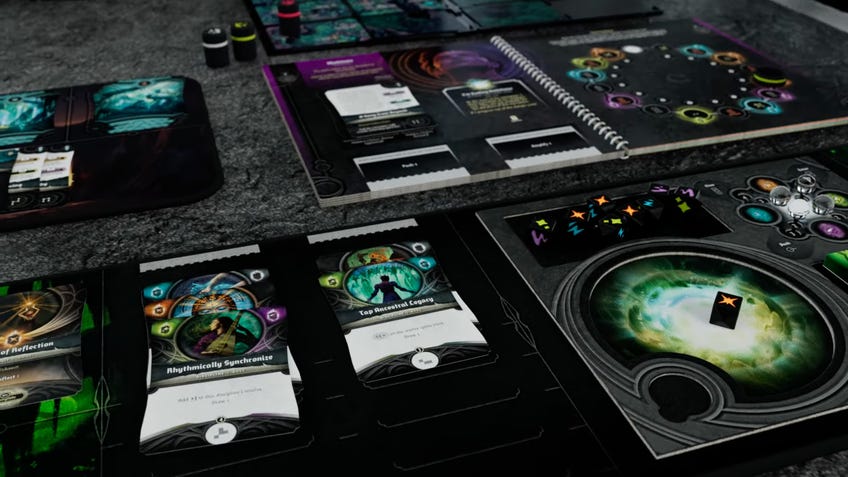Unsettled and Vindication designer’s MMO-like Spirit Fire claims to be the first “living board game”
This high fantasy solo board game boasts World of Warcraft, Metroidvanias and living card games among its influences.
Bold, ambitious pitches are a dime a dozen in the tabletop space, especially when projects jockey for attention in Kickstarter’s crowdfunding attention economy. Such seemed to be the case with Spirit Fire, which claims to be the very first “living board game” and a solo experience that transcends its high fantasy setting. Surprisingly, there might actually be some truth to this nonlinear experiment on the kitchen table.
Spirit Fire is developed by the Oregon-based Orange Nebula, which previously designed Vindication and Unsettled. Their latest creation is a “love letter to solo play” that names living card games, Metroidvania video games and World of Warcraft amongst its inspirations. It wants to be so much more than a simple hack-n-slash dungeon delver where rewards amount to a sharper sword and larger caches of gold, and the campaign page waxes long on emphasising wisdom over weaponry. At $99, it’s a heck of an ask for a single-player board game that isn’t interested in dragons or dungeons in the traditional sense.
Players will create a character represented by - and this is a massive understatement - a box full of cards. In reality, Spirit Fire’s character box is a collection of attributes, traits, skills and backgrounds that compose who they are in the board game’s universe, but it’s also a repository for the experiences, scars, growth and potential unlocked during their adventures. Everything is represented by card that feed into an ever-changing deck, a la living card games such as Arkham Horror or Marvel Champions: The Card Game. Smaller display boxes help keep everything separate between sessions, and with 600 cards in the base set that’s sure to come in handy.
If the character box contains everything that composes the player’s character, the Realm Box represents the world they inhabit. Think of these like major storylines in an RPG video game or expansions in an MMO - they’re even broken down into sealed packets representing major questlines. Like other LCGs, how a character overcomes the challenges in each Realm Box will add fresh cards to their deck: boons, burdens, treasures, companions and more. The designers say no one strategy or deck construction should be dominant over others, even though quests are either pass or fail scenarios. Players will have the opportunity to reflect on their decks and refine their strategies before tackling the obstacle in front of them.
As characters explore a realm, map cards will reveal interconnected locations and quests to tackle. Challenges might look like a standard environmental hazard or ask players to decipher an archaic language found in a forgotten ruin. There is no traditional combat in Spirit Fire, as the game puts major stock in “emotionally-driven experiences with aspirations beyond the expected iterations on tactical combat”, according to the crowdfunding campaign. Some of these challenges might even be internal conflicts as the player wrestles with their character’s shifting ethics and worldview. Again, expect these struggles to be represented with their own cards.
Challenges and encounters are represented in a spiral book where a player’s deck will be tested. In contrast, personal quests are packs of cards that a player can open at any time, regardless of which realm they’re exploring. Some of these personal quests will be immediately available, while others must be unlocked through play. The basic Spirit Fire box will come with a few to start, and Orange Nebula will naturally sell more in the future.
Watching Spirit Fire’s official trailer shows a ton of interlocking systems all pinging off one another - experiences can shift your resolve, which might trigger unlocking some new potential, which can then be spent on motes of understanding or unlocking rewards from the current challenge, etc. Some players might feel their eyes glaze over, while veteran solo board games will feel as though they’ve been granted direct access to the cookie jar. Regardless, Spirit Fire is genuinely attempting to create a board game with all the design sensibilities and free form decision making of a living card game.
Players can opt to use a “drop-in/drop-out” multiplayer system that allows other players with their own character boxes to join each other in tackling a Realm Box’s obstacles while not spoiling the overall progress for any one person. Because discoveries unlock internal, emotional potential and there’s not much traditional loot, there’s no hard in adding one or two friends to what is otherwise an expressly solo experience.
Spirit Fire was designed by Tom Mattson and Marc Neidlinger and illustrated by Sergio Chaves and Krista Zimmerman. A Kickstarter campaign for a physical edition of the game runs through November 15th, and while Orange Nebula says it would like to pursue wider retail availability, they can’t confirm when that might happen. Fulfilment to backers is expected to begin in December 2024.



